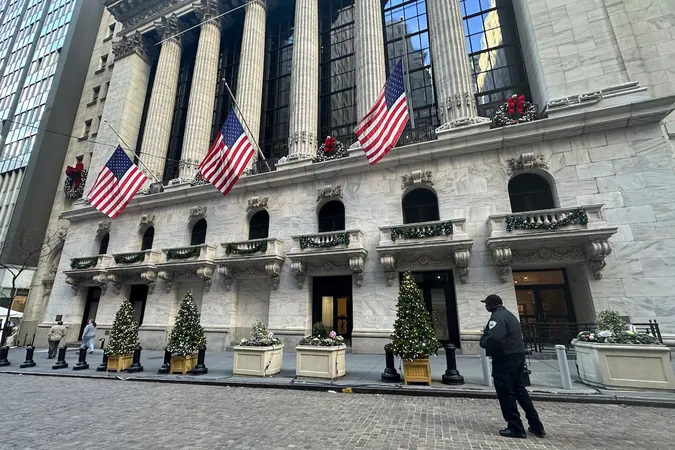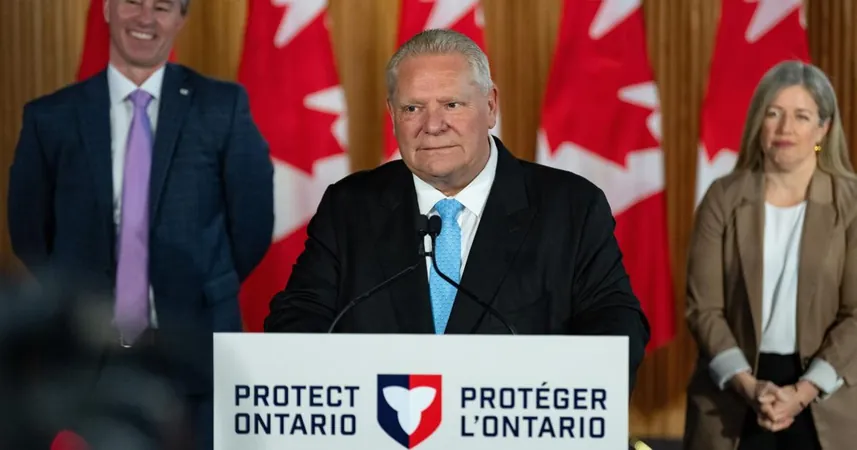
Major U.S. Banks Abandon Carney-Led Climate Alliance as Political Climate Shifts
2025-01-02
Author: Emily
In a significant move indicative of changing attitudes toward climate initiatives, several major U.S. banks have withdrawn from the Net-Zero Banking Alliance (NZBA) amid expectations that opposition to environmental, social, and governance (ESG) measures will intensify with the anticipated return of Donald Trump to the White House.
Morgan Stanley recently joined the ranks of banks exiting the NZBA, which was established in 2021 with the goal of mobilizing hundreds of billions of dollars over the next 25 years to significantly reduce greenhouse gas emissions and transition to a low-carbon economy. This departure follows the exits of several other financial giants in recent weeks, including Bank of America, Citigroup, Wells Fargo, and Goldman Sachs, all of which are components of the Glasgow Financial Alliance for Net Zero (GFANZ), co-chaired by former Bank of Canada and Bank of England governor Mark Carney and Bloomberg L.P. founder Michael Bloomberg.
Though Morgan Stanley did not elaborate on its decision to leave, its withdrawal takes place against a backdrop of escalating pushback against ESG principles, spearheaded by Republican politicians at both federal and state levels. Morgan Stanley spokesperson Carrie Hall stated that the bank remains committed to its net-zero objectives, emphasizing their role in facilitating the decarbonization of the real economy through client support and capital investment.
Similarly, Bank of America and Citigroup reassured stakeholders that their departures from the alliance do not equate to a retreat from their net-zero ambitions. Bank of America noted that its CEO, Brian Moynihan, is actively involved in the GFANZ's strategic leadership group, while Citigroup expressed its ongoing support for GFANZ's mission of removing investment barriers in emerging markets.
The exodus of these banks is raising questions about the future of the NZBA. Opponents of ESG initiatives have gained momentum in the U.S., particularly in states like Texas, West Virginia, and Florida, where legislation and penalties aimed at financial institutions using ESG principles have been introduced, often framed as harmful to fossil fuel industries.
Notably, Canadian banks like the Royal Bank of Canada and Bank of Montreal find themselves in a similar position, having sought to assure authorities in states like Texas and West Virginia of their continued support for the oil and coal sectors. The Canadian Bankers Association has not confirmed the status of these institutions within the NZBA but stated that each bank develops and reports its own climate strategy.
Highlighting the contentious political landscape, Texas Attorney-General Ken Paxton has launched lawsuits against major asset managers, including BlackRock, State Street, and Vanguard, accusing them of stifling the coal industry through anti-competitive practices. These asset management firms have also been affiliated with initiatives aimed at promoting net-zero goals.
In a congressional context, the House Judiciary Committee, led by Ohio Republican Jim Jordan, alleged the existence of a so-called 'climate cartel', claiming that left-wing activists and leading financial institutions are colluding to impose extreme ESG criteria on American businesses. This committee is set to investigate the sufficiency of current antitrust measures to counter such purported collusion.
The NZBA has previously encountered tensions among its members, with U.S. banks expressing concerns about legal repercussions from stringent decarbonization mandates in 2022. Canadian banks have echoed similar fears regarding governance and legal implications that could arise from being part of such alliances, particularly regarding their commitment to high-emission industries, which are crucial to their national economy.
As the political and financial landscape evolves, the ramifications of these departures from the NZBA may significantly reshape the global approach to green finance and climate commitments.









 Brasil (PT)
Brasil (PT)
 Canada (EN)
Canada (EN)
 Chile (ES)
Chile (ES)
 Česko (CS)
Česko (CS)
 대한민국 (KO)
대한민국 (KO)
 España (ES)
España (ES)
 France (FR)
France (FR)
 Hong Kong (EN)
Hong Kong (EN)
 Italia (IT)
Italia (IT)
 日本 (JA)
日本 (JA)
 Magyarország (HU)
Magyarország (HU)
 Norge (NO)
Norge (NO)
 Polska (PL)
Polska (PL)
 Schweiz (DE)
Schweiz (DE)
 Singapore (EN)
Singapore (EN)
 Sverige (SV)
Sverige (SV)
 Suomi (FI)
Suomi (FI)
 Türkiye (TR)
Türkiye (TR)
 الإمارات العربية المتحدة (AR)
الإمارات العربية المتحدة (AR)